Launched and managed by BlackRock Fund Advisors in 2001, iShares Expanded Tech Sector ETF (NYSEARCA:IGM) provides broad exposure to the technology sector, investing in various technology-related companies in public equity markets in the United States and Canada. IGM aims to track the performance of the S&P North American Expanded Technology Sector Index by using a representative sampling technique. IGM also employs a market-cap weighted strategy so that each holding does not exceed 9%. The fund invests in growth and value stocks in various sectors within tech, including IT, SaaS, semiconductors, as well as stocks in retail and commercial services.
I rate IGM ETF a Buy. IGM’s portfolio has a large focus on Big Tech as well as mid-cap tech stocks. However, the fund is continuously shifting its focus to Big Tech, increasing their weighting in the portfolio as recessionary concerns ease and these companies begin to climb out of their slump. Being at the cutting-edge of technology, these companies continue to generate large amounts of cash flow and revenue. They largely control the market and have a certain competitive advantage that makes it difficult for smaller competitors to contend with them. Moreover, these tech giants dominate IGM’s portfolio and are the main drivers of change that propel the fund’s growth.
Holding Analysis
With a large focus on companies within the United States, IGM’s holdings do not entirely focus on the technology sector. IGM invests a majority of its portfolio in technology, but it also invests a smaller portion in communication and consumer cyclical spaces. Within technology, the fund allocates a large portion to both Technology Services, encompassing offerings like IT consulting and cybersecurity services, and Electronic Technology, including companies involved in manufacturing electronic equipment. This mix ultimately adds more diversity and captures a broader spectrum of the technology sector.
etf.com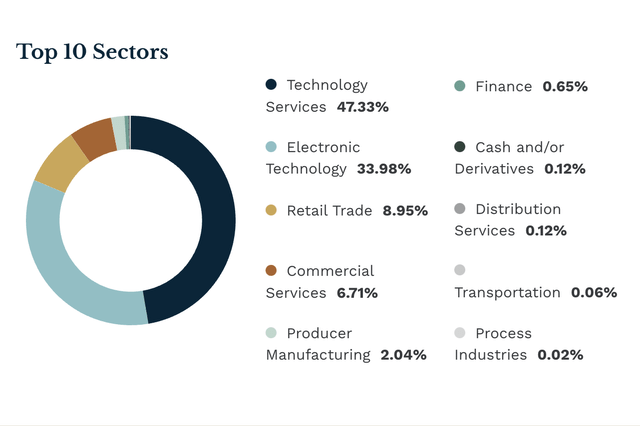
Despite its extensive portfolio of 331 total holdings, IGM places a significant emphasis on its top 10 holdings, with a particular focus on the top 5. The fund gives significant weight to Big Tech companies like Microsoft (MSFT), Apple (AAPL), and NVIDIA (NVDA), making it so that these top industry players are the primary drivers of change within this ETF. The top 10 holdings ultimately constitute over 50% of the entire portfolio, and a precise distribution of each of the top 10 holdings’ weights can be seen in the graphic below.
Seeking Alpha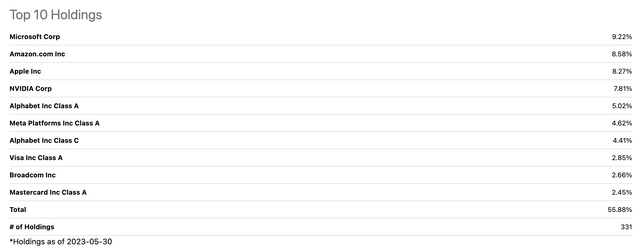
Strengths
Historically, IGM’s Total Return has mirrored that of the Invesco QQQ Trust ETF (QQQ), and in the last few years, IGM has even slightly outperformed the QQQ. Both IGM’s Total Return and the QQQ experienced a decline in late 2021 and 2022 due to concerns about recession and inflation. However, as the economy began showing signs of recovery, IGM’s Total Return experienced a similar recovery as well. Given optimistic projections for the QQQ throughout 2023 and extending into 2024, I foresee IGM performing on a similar trajectory. Despite common perception of QQQ as the superior tech growth ETF, IGM’s comparable performance is notably impressive. This achievement stands out particularly when considering that IGM’s expense ratio is twice that of QQQ, and its dividend yield is a modest 0.43%, compared to QQQ’s higher yield of 0.61%. This tells me that IGM can be an equally attractive option for investors despite its higher expenses and lower returns.
Seeking Alpha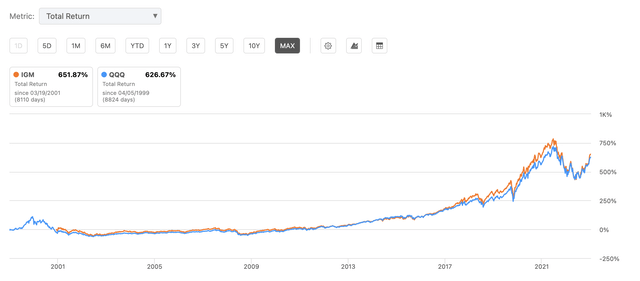
IGM has also continuously made changes to its portfolio weighting, especially in the last year. From the holding distribution shown above, it is evident that since the start of 2023, the fund has added more weight to Big Tech companies such as Microsoft and Apple, but what strikes me the most is NVIDIA’s increase in weight from 3.9% to 7.81% as of today. NVIDIA has also reported growth of 175% in 2023 alone. Given NVIDIA’s recent impressive performance and its promising future outlook, IGM is put in a favorable position to capitalize on NVIDIA’s success, especially considering the significant weight NVIDIA carries within the fund’s portfolio.
iShares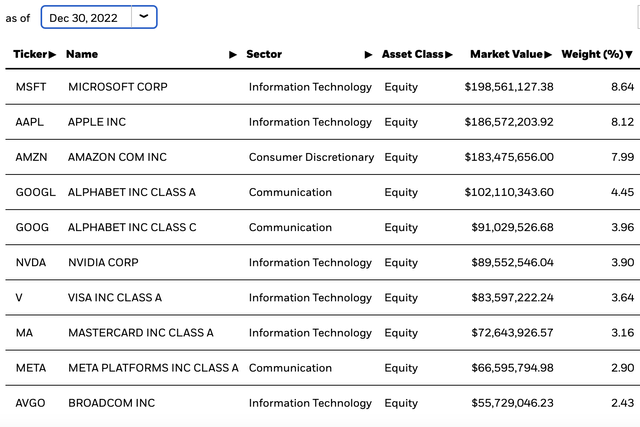
Big Tech Volatility
While the weighting shift towards bigger market players in this portfolio can be very profitable in the short-term, it also leaves the fund susceptible to concentration risk. This is especially concerning considering that in 2022, Big Tech stocks fell by over 30%, where the overall market drop was only 20%. This tells me that Big Tech may be particularly sensitive to economic downturns and can be subject to short-term volatility.
According to quant ratings, IGM has an Annualized Volatility of 30%, where the median of all ETFs are nearly 20%. With a higher Annualized Volatility than the median, IGM’s portfolio has much higher risk and will therefore experience greater price fluctuation than most other ETFs. With that being said, IGM’s Top 10 Holdings percentage of 56% also is much higher than the median of all ETFs at 36%, reinforcing my original hypothesis that IGM’s concentration in Big Tech may subject the fund to greater volatility, especially in periods of economic uncertainty.
Seeking Alpha
Big Tech’s Strong Performance in 2023
Despite Big Tech’s volatility during periods of economic recession, many of the stocks within IGM’s portfolio, including Microsoft, Apple, Amazon (AMZN), and Alphabet (GOOGL) have shown strong resilience and growth following the dip in 2022. As of 2023, these four stocks have reported increases of 40%, 45%, 45%, and 40% respectively. The performance of these four stocks definitely contributed to the growth of IGM in 2023.
Seeking Alpha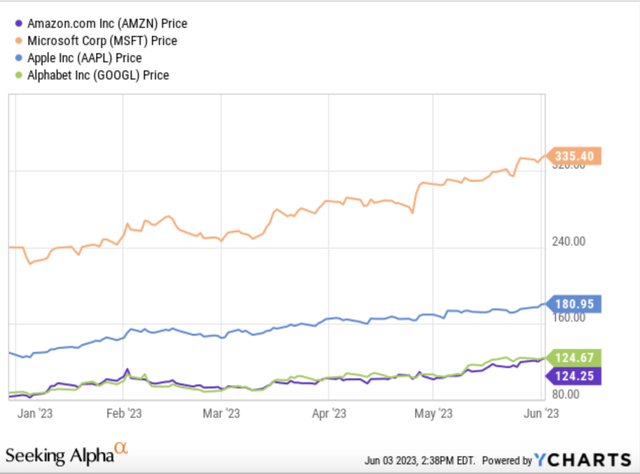
According to the latest Markets Live Pulse survey, 41% of survey respondents said that they were more interested in buying stocks that focused more on profitability with high revenue growth and cash flows, rather than on economic conditions and interest rates. Investors noted that they were primarily interested in taking long positions in stocks like Apple and Microsoft. This demonstrates that despite the economic or market conditions, investor sentiment still plays a major role in a stock’s performance, helping to counteract the negative impact of volatility of Big Tech during economic downturns.
Conclusion
This ETF may be especially appealing for investors looking to invest primarily in Big Tech, and with its strong track record, I cannot say that Big Tech is not one of the strongest growing industries out right now. IGM effectively capitalizes on this trend and has gradually added more weight to promising stocks this past year. Additionally, IGM has historically closely followed QQQ. Given the optimistic forecast for QQQ throughout 2023 and into 2024, it is reasonable to expect a similar performance from IGM as well. While Big Tech is the primary focus in this ETF, the fund also invests in a myriad of other industries, adding diversity to its portfolio and mitigating industry-specific risks.
I rate IGM a buy as I believe that the fund will be very profitable in both the short-term and long-term. Technology has historically reported very strong and steady growth, and now that the economy is experiencing somewhat of a recovery, the days of the tech slump should be long behind us.
Read the full article here






